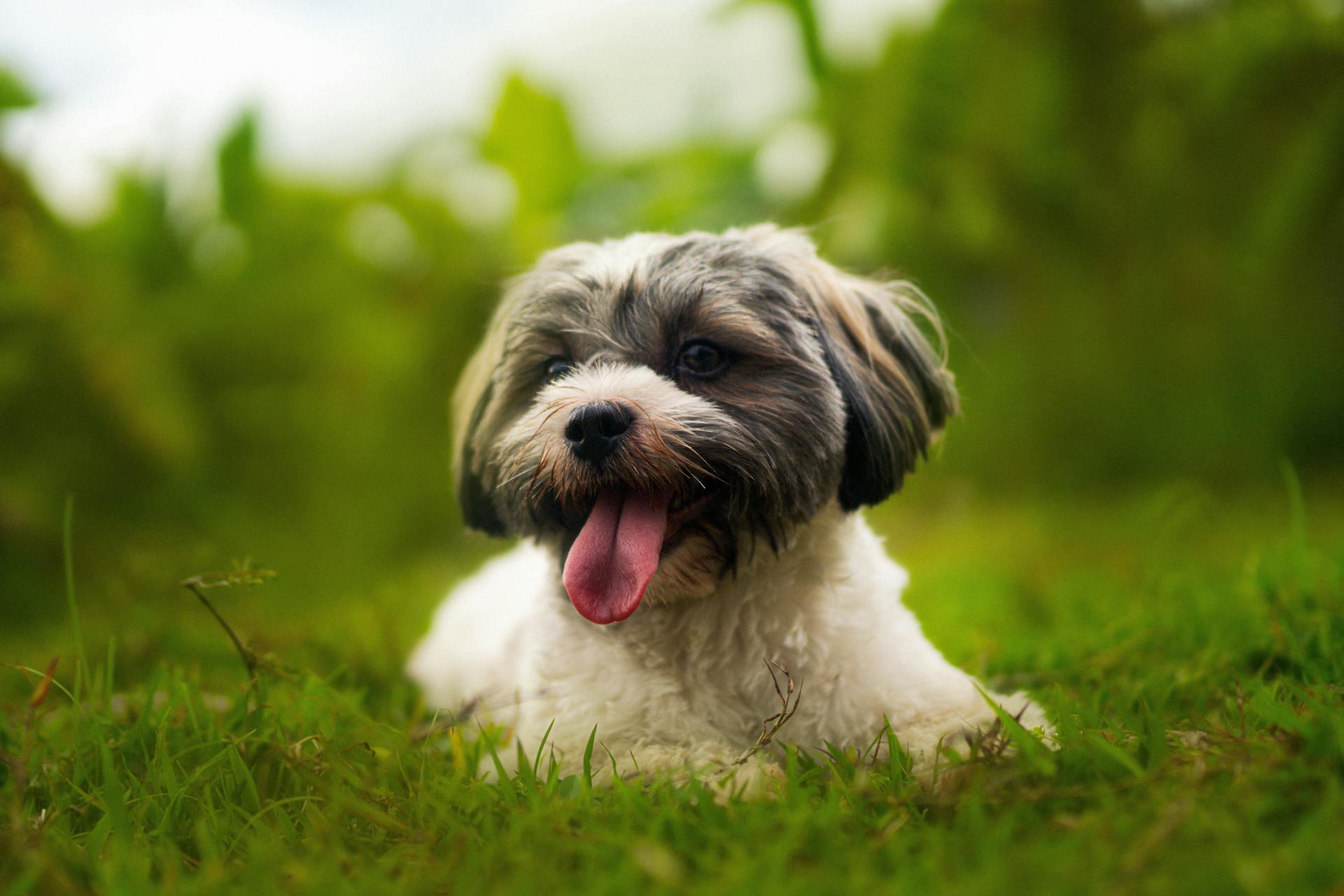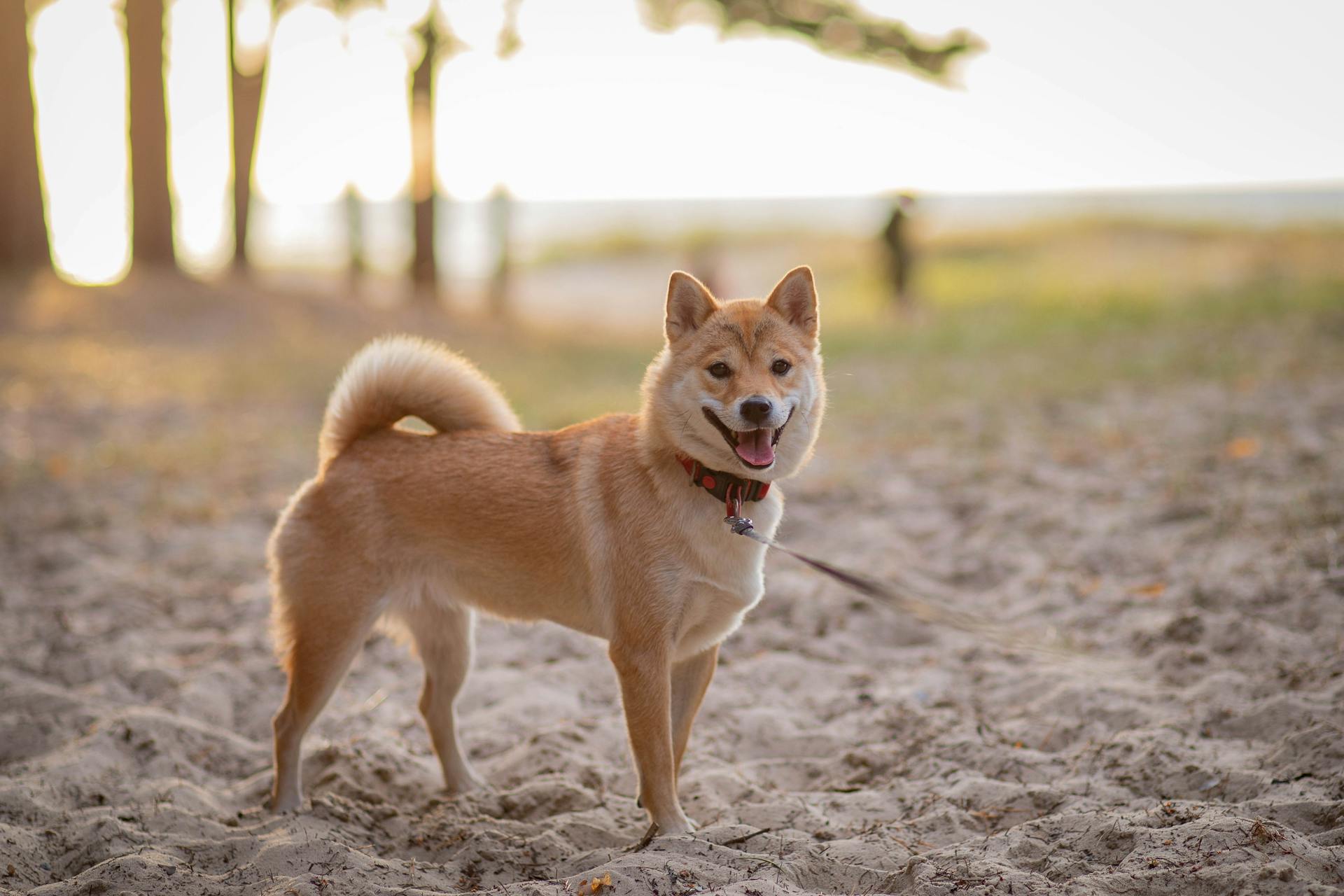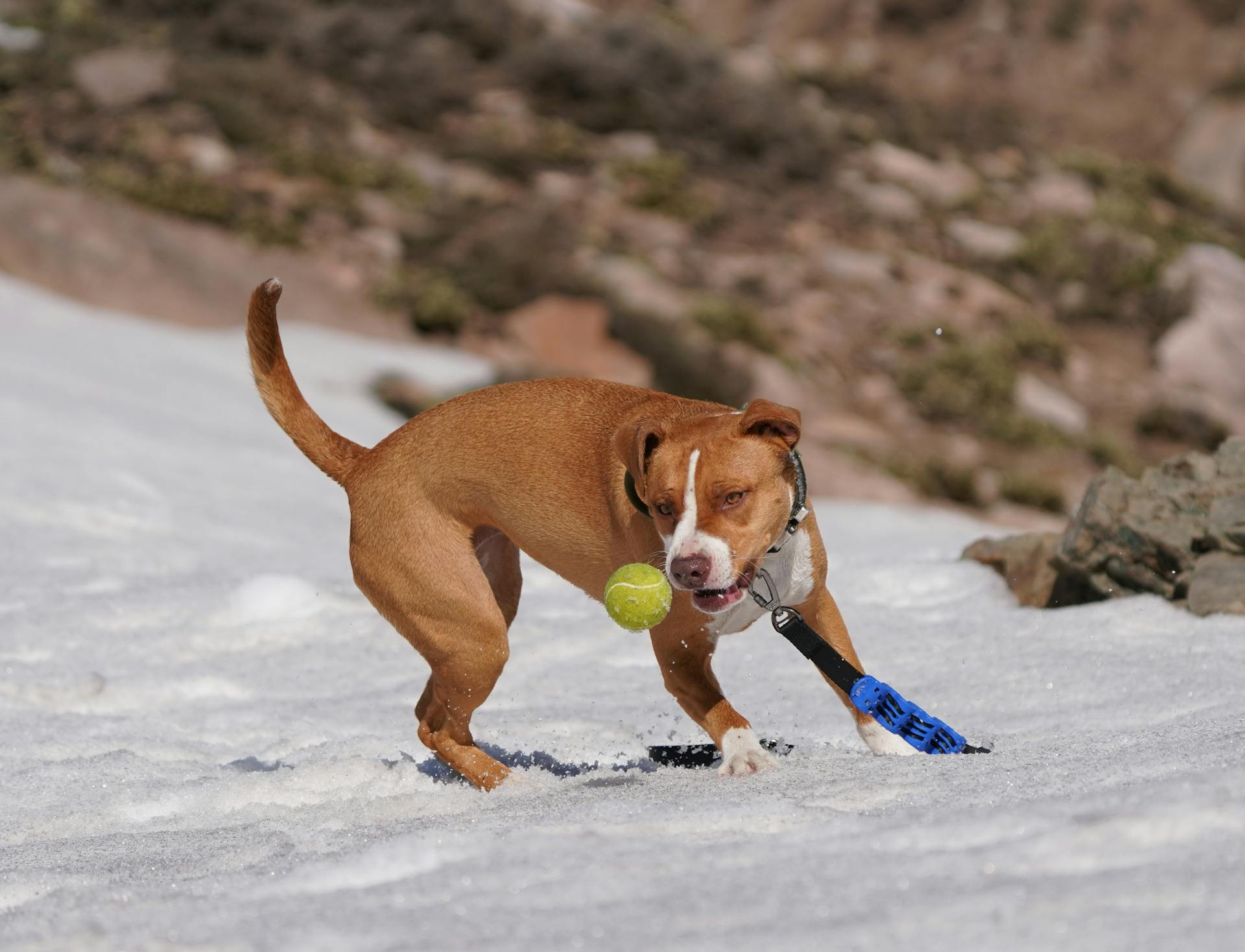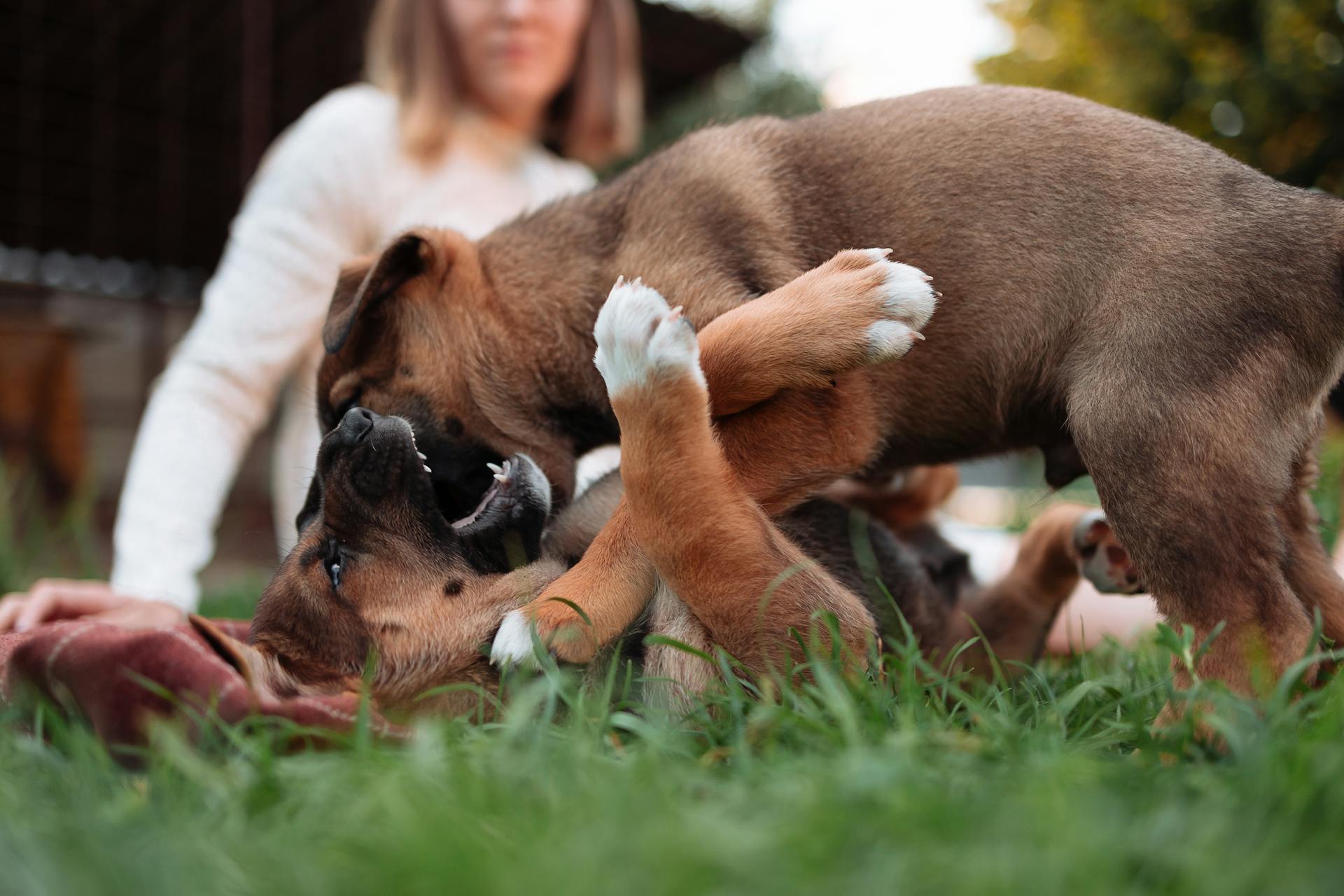
The Havanese is a small dog breed that originated in Cuba and is known for its playful, gentle, and affectionate nature. They are a great companion dog, often described as "velcro dogs" because of their tendency to stick close to their family members.
Havanese dogs typically weigh between 7-13 pounds and stand between 8.5-11.5 inches tall at the shoulder. They have a double coat that requires regular grooming to prevent matting and tangling.
One of the most distinctive features of the Havanese breed is their beautiful, silky coat that comes in a variety of colors including white, cream, and fawn. Their coats can also be a combination of these colors, making each Havanese dog unique.
Additional reading: Dogs Breeds That Start with B
Physical Characteristics
The Havanese dog is a small but mighty breed with a big personality. They typically weigh between 7-13 pounds.
Their coats come in a stunning variety of colors and markings, with 16 different coat colors to choose from, including black, silver, fawn, red, and more. And with eight marking patterns to boot, every Havanese is unique.
Their ears are broad at the base and set high on the head, lifting when they're perked up and listening for treats or the sound of keys in the door.
Their eyes are large and almond-shaped, shining with intelligence and humor. They're usually a dark brown, but can be lighter in chocolate-colored dogs.
Their broad nose is solid black, unless they have a chocolate-colored coat, in which case it's solid brown.
Their long, silky coat is not only beautiful, but also serves as a natural sunscreen. It's light and easy to care for, making it perfect for busy owners.
Here are the different coat colors and marking patterns found in Havanese dogs:
Temperament and Behavior
Havanese dogs are known for their friendly and social nature, making them perfect for meeting new people on walks.
They thrive on attention and affection, and their big personalities belie their small stature. They'll shower you with affection in leaps and bounds, and it's not uncommon for them to pick up 10 new friends on a three-block walk.
Havanese dogs are intelligent clowns by nature and will find ways to put a smile on your face. They'll let you know it's time for a play break when they drop a toy at your feet and give you that look with their head cocked to one side.
They're generally pretty good watchdogs who're happy to keep an eye on their family, but excessive barking can be a problem with Havanese dogs if they're not trained properly.
Here are some key facts about the temperament and behavior of Havanese dogs:
Havanese dogs are excellent companions for children due to their lively nature and comical antics, but they should be supervised when interacting with infants.
Care and Maintenance
Havanese dogs require daily brushing to keep their coats free of mats and tangles.
Their silky double coat needs to be brushed daily, especially if you leave it long, to prevent matting and tangling.
Brushing is a great bonding activity for you and your Havanese, and most enjoy it.
A pin brush works best for longer hair, and it's recommended to use a moisturizing spray when brushing.
You can also clip their fur short and give regular haircuts to prevent matting.
Their nails need to be trimmed about once a month, or whenever you hear them click-clacking on the hardwood floors.
Bathing is necessary every one to three weeks, depending on how dirty your pup gets outside.
If you have a lighter color Havanese, you may also need to use tear stain wipes around their eyes.
Keeping the hair around the eyes clipped also helps with staining.
Dental care is crucial for Havanese dogs, and brushing their teeth regularly can keep them healthier longer and lessen the need for extractions.
Brushing should start early, twice a week, and work up to daily, with your veterinarian showing you the correct technique.
Related reading: Dog Breeds That Don't Need Grooming
Training and Discipline
Building confidence in your Havanese puppy is key to helping them become the social butterfly they were meant to be. You can help them along by introducing them to new people, places, and other dogs in a controlled and calm manner.
Havanese are intelligent and easy to train, they enjoy learning new tricks and might even invent a few to get a laugh. Competitive obedience and agility trials are great activities to keep your puppy from getting bored.
Potty training can be a challenge with small dogs like Havanese, they have small bladders and need to go out more frequently. Consistency is the key, take your pup out about 20 minutes after every meal and reward them when they potty outside.
A crate with the right size is a great way to help potty train your puppy, it mimics the den-like feel they prefer. The crate should be big enough for them to turn around in, not too small and not too large.
Positive reinforcement works best for potty training, avoid negative reinforcement as puppies will avoid accidents by hiding them. A covered area outside for potty training can also help, some puppies will avoid going out in the rain at all costs.
Additional reading: How to Train a German Shorthaired Pointer to Hunt
Diet
Havanese dogs do well on high-quality commercial dog food, and it's essential to choose a balanced and life-stage appropriate formula, whether it's for a puppy, adult, or senior dog.
Your veterinarian can help you choose the perfect food and the correct amount to feed your pup. They can also advise on how often to feed based on your dog's age.
Even a small extra pound can make a difference in your Havanese's overall health, so it's crucial to monitor their weight and adjust their diet accordingly. If you see your pup with more waddle than wiggle, talk with your vet about a diet and exercise plan.
Puppies need to eat several times daily to get all the nutrients they need to grow strong and healthy, while adult dogs are fine with two or three daily meals. Portioning your dog's meals with a measuring cup can help prevent overconsumption and weight gain.
Havanese dogs don't have any special nutritional requirements, but they do benefit from small-breed diets designed for their life stage.
Consider reading: Life Expectancy for a Boston Terrier
Frequently Asked Questions
Is Havanese a good house dog?
Generally, Havanese dogs make great house pets, but they do require regular exercise and attention to thrive. However, they can be prone to barking, which may not suit homes with shared walls
What two dogs make up a Havanese?
The Havanese is a cross between the Blanquito and the poodle, with possible influence from other bichon types. This unique blend of breeds gives the Havanese its distinctive characteristics and charm.
Do Havanese dogs like to cuddle?
Havanese dogs are known to be extremely affectionate and enjoy cuddling, making them a great fit for owners who love snuggles. They even have silky hair that's perfect for running your fingers through.
Featured Images: pexels.com


